2/12/2006
David Oliver is one of my favorite magicians. This is not just because he has been my mentor and friend for the past 10 years, but because of his great bird act. Critically, Oliver has been called a Neo-classicist magician—blending his personality and the style of today with the greatest illusions known to magicians. His act is an extension of himself and looks spectacular in front of 10 or 1,000 people.
Along with performing all over the
David Oliver Interview in audio: You'll need the free macromedia flash player if you don't see the playbar. ~2o minutes
[you may click on all photos to enlarge]
MagicInterviews: You’ve been a fulltime professional for nearly 20 years. How has your relationship with your act/show changed over this period?
David Oliver: In looking at my performances over the past 20 years or so, I would have to say that I have grown INTO my show. Allow me to clarify. I used to attempt to perform in such a way, that I was trying to cram as much "stuff" into the show as possible. I thought that was the way to create a successful show and character. The more "stuff" that was involved, the more the audience would enjoy the act/show. Because there was so much stuff (i.e., props, tricks, characters, comments, asides, etc) there was no connection between anything (except for everything being purple!). The relationship between my act and me as the performer was lost in a hodgepodge of confusion. Sure, it was somewhat entertaining for the audience. Sure, I received some excellent reviews. But there was something missing. Although I could never articulate what that certain something was, I knew there was something missing. Eventually, I was able to figure out what was missing. It wasn't more "stuff." That missing something was my true self.
All of us try to have some sort of performing character. That character could be a wizard, a clown, the goofy scientist or the mysterious mind-reader. The character could simply be the performer being him/herself. The only important thing, is that the character must be genuine to the performer. We have all emulated other performers. When starting out in magic, we copy the successful performers/acts that we see. It's a common way to begin. We eventually hear the suggestion to "be original" over and over. And that can be very difficult to do. Especially if you are searching for originality in the wrong places. Initially, I tried to be like many of the performers I enjoy watching. Why? Because they were not only successful, but they were fun for ME to watch. If I enjoyed them, then certainly the type of audiences I worked for would enjoy them as well. This is not to say that I was outright copying their acts. Absolutely not. But their personality traits seemed to pop up throughout my shows for years. And although my show was a solid, workable entity, the guy in charge (me) seemed to have multiple personalities. Once I began to truly understand who I was as a person onstage, the rest of the show started to fall into place. The guy you've seen onstage in my shows for the past decade is definitely me.
MI: How has it impacted how you understand magic or what magic means to you personally?
D.O.: Let's look back at my character transformation for a moment. Originally, I used to try to be as clever and mysterious as possible. I figured that if I performed the most amazing tricks and effects, with the eyebrow-raising persona I had seen so many others use, I would be a success. That wasn't the case. For me, now, even though I proudly call myself a magician, the magic is secondary. My magic isn't about the clever tricks. It isn't about how funny I can be. It's not about me knowing something they don't. It isn't even about 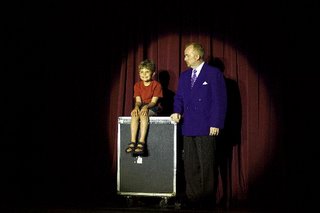 the purple. True magic to me, is about the one-on-one connection with my audiences. Did they have fun? Were they moved? Was I moved? Did we share an experience that is, in effect, a once-in-a-lifetime opportunity? The answer for me, must be "yes" to all of these questions. I no longer try to rush through a show to get to the next one. It is far more important to be in the moment.
the purple. True magic to me, is about the one-on-one connection with my audiences. Did they have fun? Were they moved? Was I moved? Did we share an experience that is, in effect, a once-in-a-lifetime opportunity? The answer for me, must be "yes" to all of these questions. I no longer try to rush through a show to get to the next one. It is far more important to be in the moment.
photo by: Mike Maione
Enjoy the experience of sharing yourself with others. They will then feel comfortable enough to be able to share themselves with you. Close-up or on stage, there must be that connection. Once you've made that connection, and more importantly, recognize how to regularly make that connection, your magic will be forever changed in a positive direction. If there is a personal connection, it won't matter what you do on stage. The audience will go on whatever ride you wish to take them on. Rather than being the destination, your magic will be the vehicle to take that journey, to a much greater destination. Performers like Doug Henning, Bill Cosby, Robin Williams and Johnny Carson, to name a few, were all able to bring you into their world when they were on stage. It really didn't matter what they DID, it was WHO they were. Whenever they performed, you enjoyed the time you spent with them. I want my audience to enjoy spending their time with me. It's all about the connection, and enjoying the journey together.
M.I: Besides being an accomplished stage and close-up performer, there’s a creative side of you that’s very strong—particularly in your ability to collaborate with others in working on material. Can you speak on a memory of a favorite collaboration?
D.O.: Collaborating with others is, for me, one of the most enjoyable things that I do. I don't consider myself to be a creative inventor-type. You know, the kind of person who sits around, inventing amazing magic, figuring out complicated card plots and designing never-before-seen illusions. That's just not me. Rather, I think of myself as a problem solver, a tweaker, more of a director in a way, when it comes to collaborating. When working with others, I'm usually the one who says, "well, what if you tried standing like this...," or, "get me a coathanger, a band-aid, a bottle of Windex and a birdbath - we'll fix your rope routine." I've been called the "MacGyver Of Magic" by more than one person.
As for one special collaboration. That's a tough one. Partially,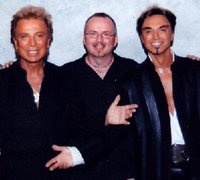 because there have been so many. Not to drop names, but in the past 25 years or so, I've had the opportunity (and extreme pleasure) of working with some top pros, including Jon Stetson, Jeff McBride, Frank Monaco, Joseph Gabriel, Mike Bent, Todd Robbins, John Cassidy, Danny Alan, Bob Sheets, Todd MacDonald, Darren Romeo, a few brief moments working out a piece of material with David Copperfield, and I was honored to have written a line that was used by the late Jay Marshall (that he first did at the S.A.M. National Centennial Celebration). Some of these encounters were full out collaborations on their shows, others were just tips and tidbits for a single effect or act. And they have each been quite reciprocal, when helping with my material. But as you can see, there have been many. To narrow it down to one is challenging. Especially after working with the kids in the S.Y.M. and at Tannen's Camp for over 20 years. I have fond memories of working with many young people, including with you, on your "Private Eye - Magic Detective" stage act, and our pal, Paul Denaro - arguably, one of the most caring people I have ever met. It's been gratifying to watch the growth of some of today's well-known young performers that I have coached and/or collaborated with including Ryan Oakes, Brian Curry, Chris Chiappini, Winston Helling, Justin Willman, Kristi Toguchi, Ashley Springer and Joshua Jay. There are so many other young performers with whom I've worked that did not pursue magic as a career, yet, have left a profound impact on my life because of the time I spent working with them. Two used magic to overcome their battles with cancer, several needed to use magic to move past family problems or learning disabilities, and I lost one of "my kids" in a horrific car accident in 1990. Not all who made an impact were involved in tragic circumstances - one kid thought he was a leprechaun. He definitely left a lasting impression! There are also a few talented teens that I am currently mentoring, that the magic community will be seeing a lot of in years to come. To mention all of them would fill up a lot of web-space (sorry, guys!).
because there have been so many. Not to drop names, but in the past 25 years or so, I've had the opportunity (and extreme pleasure) of working with some top pros, including Jon Stetson, Jeff McBride, Frank Monaco, Joseph Gabriel, Mike Bent, Todd Robbins, John Cassidy, Danny Alan, Bob Sheets, Todd MacDonald, Darren Romeo, a few brief moments working out a piece of material with David Copperfield, and I was honored to have written a line that was used by the late Jay Marshall (that he first did at the S.A.M. National Centennial Celebration). Some of these encounters were full out collaborations on their shows, others were just tips and tidbits for a single effect or act. And they have each been quite reciprocal, when helping with my material. But as you can see, there have been many. To narrow it down to one is challenging. Especially after working with the kids in the S.Y.M. and at Tannen's Camp for over 20 years. I have fond memories of working with many young people, including with you, on your "Private Eye - Magic Detective" stage act, and our pal, Paul Denaro - arguably, one of the most caring people I have ever met. It's been gratifying to watch the growth of some of today's well-known young performers that I have coached and/or collaborated with including Ryan Oakes, Brian Curry, Chris Chiappini, Winston Helling, Justin Willman, Kristi Toguchi, Ashley Springer and Joshua Jay. There are so many other young performers with whom I've worked that did not pursue magic as a career, yet, have left a profound impact on my life because of the time I spent working with them. Two used magic to overcome their battles with cancer, several needed to use magic to move past family problems or learning disabilities, and I lost one of "my kids" in a horrific car accident in 1990. Not all who made an impact were involved in tragic circumstances - one kid thought he was a leprechaun. He definitely left a lasting impression! There are also a few talented teens that I am currently mentoring, that the magic community will be seeing a lot of in years to come. To mention all of them would fill up a lot of web-space (sorry, guys!).
Of course, your question still needs to be answered. I suppose if I had one favorite memory of a collaboration, it would have to be with a young man named Jason Holterhaus. About twelve years ago, Jason and I constructed, created and built an act around a Shop-vac® and a Daniel Boone-style raccoon hat. Over a period of about two years, we wrote and rewrote the act, adding bits, magic and character that all tied together. The act was called the "Sux-A-Lot 2000™." It was loosely based on the (then) new pop culture phenomenon known as "infomercials." The idea for the act began with the purchase of the raccoon hat at a roadside gas station one day. It eventually evolved into a fast-paced borrowed bill routine that included a bowling ball production, a mutilated and restored raccoon, a full person levitation, some really bad puns, an exploding Shop-vac® and a Twinkie®. Jason performed this act at a few conventions, variety shows and banquets and won many awards with the act, including being the first talking act to ever win the senior stage competition at Tannen's Camp. He received rave reviews wherever he performed. Although not performing magic anymore, Jason graduated from college, and now uses his creative talents as a television director for CNN, Comcast Cable and others. He has become one of my dearest friends, and is one hell of a director.
M.I.: If you could perform on the same bill with any other entertainer, alive or deceased, who would it be and why?
D.O.: Great question. I can honestly say that I've never contemplated this before. However, now you've got me thinking. I think I'm partial to clowns. Not your typical red-nosed variety. More like the subtle clown. There are so many "clown-ish" entertainers with whom I would've loved to have had the chance to work with, including Jackie Gleason, Donald O'Connor, Dick VanDyke, Jack Benny, Gene Kelley, Robin Williams, Bill Cosby, Bob Hope, Ray Bolger, Elton John and Charlie Chaplin. They all were/are larger-than-life characters that gave of themselves while performing, mostly in the persona of the underdog. With the heart and soul of a clown, each was/is a consummate professional who understood their craft, and more importantly, brought their audience into their world to cheer them on. It didn't matter what was happening off stage or off screen, when they were on, they were "on." They are some of the most memorable entertainers the world has ever known. It would have been fun to work with them.
However, if I had to choose one specific person with whom I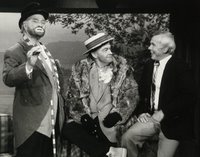 would've enjoyed working with, that would have been the late Johnny Carson. Mr. Carson embodied the same characteristics of the people I mentioned above, entirely without ego. He was a clown who perceived his job as that of a party host. Bring your friends together, and let them shine for each other, just guide them and stay out of their way. He would always allow his guests to be the star, and do whatever it took - be it an ad-lib, a moment of silence, or a doubletake - whatever it took, to make his guest feel warm, welcome and on top of the world. He was the true star, but he wouldn't let you know it. He sat back, and watched the other performers play. If he liked you, the entire country liked you. He was like a trusted family member. He tucked us into bed at night - every night. At the end of the day, after watching the news of the day, Johnny Carson made us feel safe, happy and at peace with the world. It would have been an honor to have worked with him.
would've enjoyed working with, that would have been the late Johnny Carson. Mr. Carson embodied the same characteristics of the people I mentioned above, entirely without ego. He was a clown who perceived his job as that of a party host. Bring your friends together, and let them shine for each other, just guide them and stay out of their way. He would always allow his guests to be the star, and do whatever it took - be it an ad-lib, a moment of silence, or a doubletake - whatever it took, to make his guest feel warm, welcome and on top of the world. He was the true star, but he wouldn't let you know it. He sat back, and watched the other performers play. If he liked you, the entire country liked you. He was like a trusted family member. He tucked us into bed at night - every night. At the end of the day, after watching the news of the day, Johnny Carson made us feel safe, happy and at peace with the world. It would have been an honor to have worked with him.
M.I.: For next question, I’d like to back track a bit. You said “It's all about the connection, and enjoying the journey together.” I can definitely see that in your bird act now--especially compared to when I saw it ten years ago. Perhaps it’s just the intimate venue of Mystery Lounge, but your approach seems to be more lighthearted in your persona and you make more of a genuine connection, which is really something that few performers, let alone magicians, do. It’s really refreshing. Do you think I’m imagining this change that I think I’ve seen in you in the 10 or so years I’ve known you?
D.O.: You are definitely not imagining the change. I think all performers grow - or should grow - as they mature. When I first began performing the bird act, it was my goal to be as good as those performers I had looked up to at the time. Emulation was the tool of choice.
Most magicians I had ever seen doing a bird act, all had the mysterious eyebrow raise, a serious facial expression, and gave off an aura of power. That is what I believed all bird acts had to be like. So, I followed in that path for quite some time. There were little touches of "David Oliver" in the act, but those were only small addition to something larger.
My act was good, I got great reactions and plenty of bookings, but I never felt quite right when performing. The person that I was trying to be when doing the bird act, was not the same as the person who performed the rest of my show, or did walk-around close-up magic the way I did, or was anything like who I was offstage. I knew this wasn't what I was looking for, but I couldn't put my finger on the reason why. I only knew that I wasn't making that connection. Most audiences commented on how good the tricks in the act were, but no one commented on the person performing the act. And it always surprised me when audience members spoke with me after a show, and mentioned how different I seemed from the guy onstage. At first, I believed this to be a good thing. I assumed I must have been a good actor, acting the "part" of the magician. It was how I was "supposed" to perform, I thought.
There is a former teacher of mine, who I have stayed in touch with since graduating high school, named Peter Travaline. "Trav" offered some advice several years ago, after I had attended college, and returned to do a show at his church. The show was to benefit his youth group, and was about 45 minutes long. His wife and kids were there, and I had known them for years. I performed the bird act along with audience participation pieces they had never seen. "Trav" asked me after the show who the other guy was. "What other guy?" I asked. "The other guy who performed all the magic to music stuff. That' was not you up there, David. When you talked, and played with the audience, you let us see YOU. That other guy wasn't you. You don't need him." At the time, I had no idea of what he was talking about. Now, I think I understand. (Thanks, Trav!)
It might have been gradual, but I remember the change happening almost over night. I had been performing at "Monday Night Magic" in NYC, on a very special night. There were many special guests in the audience, as well as on the show. I was asked to open the show with the bird act (as I done many times before), because it was a solid act, and the producers could count on me to set the tone for the show. The act began as I had done for almost twenty years, with the music thumping as I entered into one overhead light. Flash paper turned into a silk which was used to produce the first bird. So far, so good. And then, IT happened.
photo by: Mike Maione
As I put the bird into the cage, my music stopped. It simply stopped. I stayed in character for what seemed like an eternity (probably more like 3 seconds), and the music returned. I continued. The music didn't. It stopped again. Another in character "look" from me silently conveyed it all, "nope this wasn't part of the usual act, folks." The music came on and off several times, all the while I was still onstage, in front of a paying
After what I assumed was a catastrophe, I received some of the best after show comments I had ever heard. Most were comments I had longed to hear about the act for the past twenty years, but had never heard. The difference was that in this performance, the audience witnessed the REAL David Oliver onstage, dealing with anything and everything as "a person," and not as the character of the eyebrow-raising magician. Laymen and magicians alike were commenting on how unexpected it was to have fun watching a bird act. More importantly, that they felt as if I had walked onstage as the cocky magician, and when the music stopped, my facial expressions and reactions made me appear as someone they could relate to - just a guy who can do some pretty cool stuff.
Although everyone had a slightly different perception of what happened that night onstage, they all agreed that the act was secondary to the performer. They all enjoyed seeing ME onstage, and it didn't matter what effects or magic I did. I had made that connection with my audience, finally. The new challenge became how to understand this connection, harness this connection and make it more than a one-time fluke. That has become my goal for the past 10 years or so (coincidentally,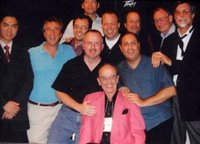 during the time that you have known me), and based on the reactions of my audiences, my peers and my friends to this growth, it seems to have paid off, so far. I'm still working at it, but it seems to be the right direction in which to take my performances. Thanks, Trav.
during the time that you have known me), and based on the reactions of my audiences, my peers and my friends to this growth, it seems to have paid off, so far. I'm still working at it, but it seems to be the right direction in which to take my performances. Thanks, Trav.
M.I.: Also, that emphasis on connection and your commitment to preparedness (i.e. M.E.A.T. case) shows the great respect you have for your audience. Can you speak about what it means, for you, to respect an audience?
D.O.: You have to respect the people who are there to see you. Firstly, if it wasn't for the audience, I could not be called a magician. I can practice in front of a mirror forever, but I can't do magic and fool myself, can I? (Well, maybe.) Seriously, if someone has brought me in to entertain a group, I owe it to the booker, the audience and myself to give the best performance possible. I try to give 120 percent every time I step onstage, and I don't settle for less. The audience doesn't care whether I was stuck in traffic, if I left my birds at home, if I am suffering from a life-threatening illness or my father died that morning. I know, because I have performed under each of those exact circumstances.
Think of it from the audience perspective. We've all been IN an audience before, watching a show, a movie or a concert. We know how amazing it is when we have been swept away to another place. We also KNOW when the performer(s) isn't on their game or are holding back. We know when the performer is not prepared, is simply "winging it," or just doesn't give a you-know-what. When this happens, we walk away disappointed. Personally, I don't enjoy disappointment in the entertainment world. Everyone suffers disappointment in the everyday world of reality. They go to a show, to get away from disappointment and to forget the outside world. They want to be taken away, on a journey, to a better place - if only for an hour or so. If I don't do my job, they are disappointed. That's why I strive to give the audience 120 percent every time. That way, if I am slightly off my game, they still get 100 percent. I don't feel it's fair to disappoint those who are supporting me.
M.I.: Second, could you speak on the issue of respect for the performer by the audience, especially in the case of magicians watching other magicians?
D.O.: Oh, man. This could be a long one. But I'll try to keep it short. My basic rule is this - if it's not your show, DON'T PERFORM! As you know, once each year, in our local S.Y.M. newsletter, I publish an article about respecting other magicians, specifically when meeting them for the first time, and also when watching someone else doing a show. In a nutshell, trying to upstage, outdo or expose the performing magician is unacceptable under any circumstance. Time and again, I've seen so-called "magicians" sit in an audience, explaining the methods of the effects to their friends, WHILE THE SHOW IS STILL GOING ON! This is unacceptable. That conversation should be had at home - with other magicians only. Not in the audience area, lobby or restroom of the show. These same magicians bring their own effects to someone else's show, and will perform them in the lobby, in the audience or yes, even the restroom. This shows NO respect for the other magician. I've seen performers unknowingly pick a "magician" volunteer from the audience, who then proceeds to try and upstage the actual magician in some way, whether trying to be funny or clever. That is absolutely ridiculous. Respect the performer as you would want to be respected in the same situation. A layman in the audience may be rude to the magician, and that is simply a shame. A magician in the audience being rude to another magician is disrespectful and unacceptable.
In over twenty-five years of teaching magic, I may not have produced the next David Copperfield, Richiardi or David Blaine. I may not have created the most amazing effects that everyone is using. I have, however, created a mindset with those who have studied with me, to not only have an appreciation for the tricks and history of magic, but to also have respect for an artform and the artists that have come before them, and have earned their respect. Teaching the next generation a little respect could be my only legacy to the world of magic, and I'd be satisfied.
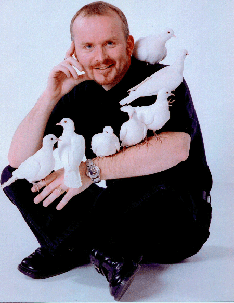
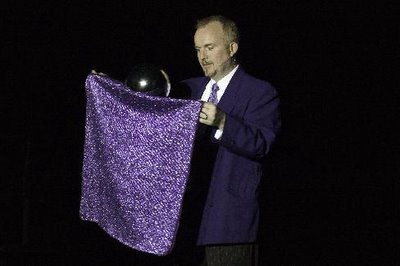



1 comments:
David Oliver's act is really special. I've had the great opportunity to see him perform a few times over the last couple of months. His dove act is seemless.
KE
Post a Comment